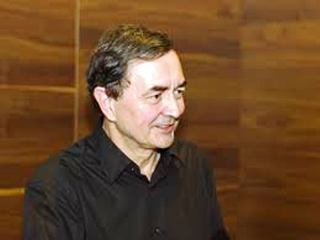|
Back
First the Poetry, Next the Propulsion New York
David Geffen Auditorium, Lincoln Center
08/02/2019 - & August 3*, 2019
Ludwig van Beethoven: Piano Concerto No. 4 in G Major, Opus 58
Franz Schubert: Symphony No. 9 in C Major (“The Great”), D 944
Pierre-Laurent Aimard (Piano)
Mostly Mozart Festival Orchestra, Gianandrea Noseda (Conductor)

P.-L. Aimard
“Music is capable of reproducing, in its real form, the pain that tears the soul and the smile that it inebriates.”
Ludwig van Beethoven (1770-1827)
A confession: Walking toward the subway to catch Pierre-Laurent Aimard in a pre-Mostly Mozart solo recital, I realized that any music before the first four measures of Beethoven’s Fourth Piano Concerto would be not only superfluous but pointless. Those four measures were Apollonian poetry.
So I retreated to my neighborhood park, delighted in the antics of the silly pigeons and prepared for the major concert of the evening.
Actually, had I had my druthers, I’d have hushed the applause for entrance of conductor and pianist, would have emptied David Geffen Hall of audience and orchestra, and simply allowed Pierre-Laurent Aimard to play those four measures in the emptiness of the auditorium. Then would have tiptoed out.
That was not to be. But Mr. Aimard, with the splendid assistance of Gianandrea Noseda and the Mostly Mozart Festival Orchestra, presented a fine rendition of this most unusual–in fact, this Schumannesque–Concerto. In fact, thanks to the flamboyant conducting of Mr. Noseda, one felt a double passion for the work.
Mr. Aimard has more than clarity. His is a pellucid tone, which, for most players, is exactly what this work requires. In fact, for this first movement, he could play simply, and allow the emotional feeling, even the cadenza, to weave its spell.
That changed, though, with the “alleged” Orpheus movement. Mr. Noseda can be a splendid conductor, but he can also fly off the handle when the opportunity presents itself. That was true in his almost manic first orchestral shouts in the second movement. Mr. Aimard replied gently enough, but the Noseda opening led to some impetuous moments. And for the finale, the original poetry was poured into a vat, transmuting itself into a virility, fire and the kind of strength which Ludwig van Beethoven–its first performer–would have loved.

G. Noseda
“No one feels another’s grief, no one understands another's joy. People imagine they can reach one another. In reality they only pass each other by.”
Franz Schubert (1797-1828)
The other work on the program was a shocker. And not in a good way. Schubert’s C Major Symphony has so many brilliant moments–abberant modulations, orchestral details, horn solos–that one wishes to sit back and enjoy them all, Schumann had it exactly right to call its 60 minutes “heavenly length.”
That was not to be. Mr. Noseda opened with a perfect horn solo by Lawrence DiBello, widened the palette–and then ran his orchestra wild with a tempo more fit for a Rossini overture than Schubert.
My Urtext edition does affirm that the composer labeled this “Allegro ma non troppo”. More compassionate writers might call the tempo here–and, to a certain degree, the rest of the symphony–“urgent.” I would have to call it hurtling without an inkling for where it was going.
If one must give a picture to this first movement, it would be the train journey from Verona Italy into the Swiss Alps, chugging speedily along but with plenty of time to see the villages, forests, towns and snowy mountains. Mr. Noseda lunged the Mostly Mozart Orchestra on as if this was a jet-train with no heed for the scenery.
All the movements were variants of the first tempo, and the finale was given the final thrusts for a whirlwind ending.
It goes without saying that the packed-out audience–which neither coughed nor applauded between movements–fell in love with the whirlwind tempos, offering endless bravos, I suppose.
“Suppose” because I walked out after the final chord. Too late for those beguiling airheaded pigeons, but not too late to recall Mr. Aimard’s sensible execution of that most otherworldly Beethoven concerto.
Harry Rolnick
|